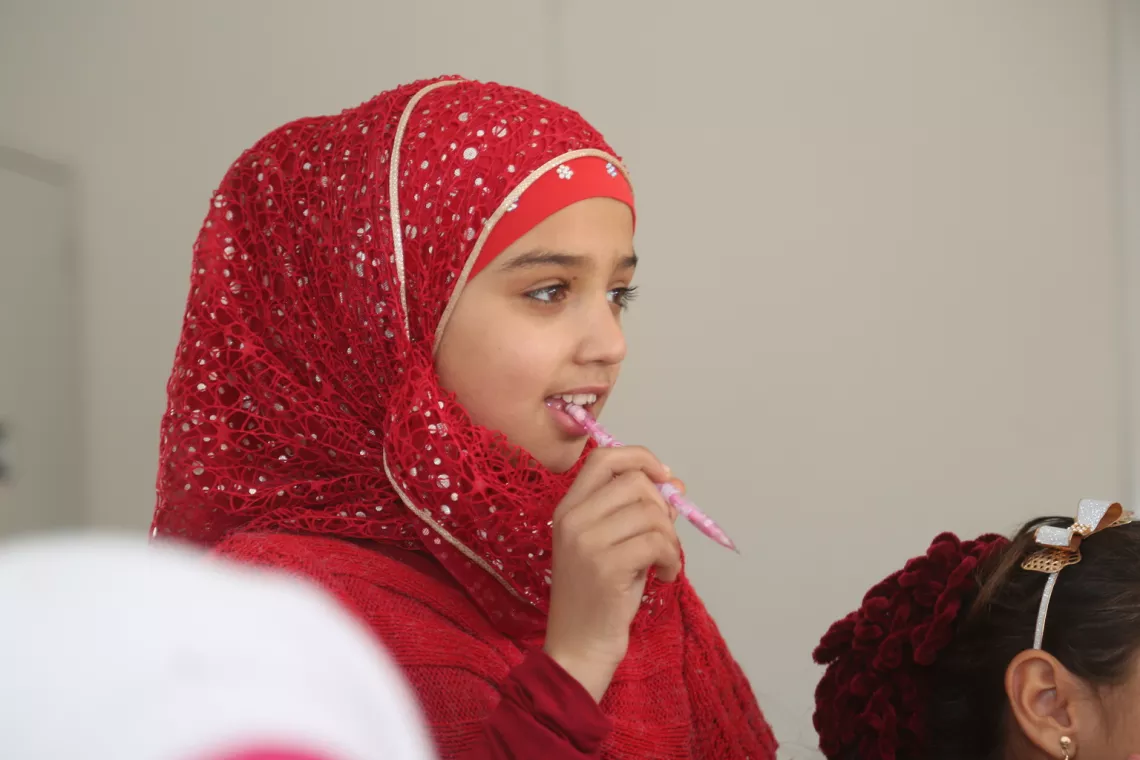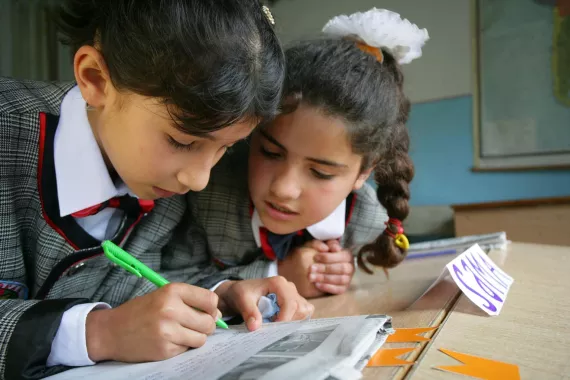Gender
UNICEF promotes equitable development, protection and inclusion for girls and boys, and the empowerment of women and girls.

- Available in:
- English
- русский
The challenge
Equity and sustainable development in Europe and Central Asia are threatened by an increase in attitudes shaped by gender-bias. The consequences can be particularly acute for children from groups who are already disadvantaged.
Gender discrimination can start early in life.
When gender discrimination is felt during early childhood, the impact may be profound. A preference for sons in parts of the region is creating the phenomenon of ‘missing girls’ as a result of gender-biased sex selection during pregnancy. Azerbaijan, for example, has rates of sex selection second only to China, and the problem is found elsewhere in the Caucasus and in some Balkan countries.
Gender differences are also seen in education. While enrolment rates are similar for girls and boys until lower-secondary school, gaps emerge at upper-secondary level. And while boys are more likely to be out of school in some countries, the enrolment gaps are largest where more girls are out of school.
Given the region's level of economic development, adolescent girls are not doing as well as they should. Where gender discrimination is entrenched, and where opportunities for female employment are limited, adolescent girls are more likely to drop out of school.

There are also clear links between the perpetuation of early marriage and school drop-out, with girls who are married before the age of 18 less likely to be in school than their peers, and girls who drop out of school more likely to be married young.
For Roma girls, refugee girls, and girls in parts of the Caucasus, Central Asia and Turkey, marriage often signals the end of education and more limited opportunities throughout their adult life.
Adolescent boys face their own challenges.
Adolescent boys may come under pressure to start earning money – a pressure that fuels migration and causes stress. And conforming to negative stereotypes about masculinity may expose boys to situations of heightened risk or violence. The region has some of the world’s highest adolescent suicide rates, particularly for boys, which contribute to lower life expectancy for males in Belarus, Kazakhstan and Kyrgyzstan.
Adolescent boys may also be drawn into risky behaviour, such as substance abuse and sexual practices that result in HIV infection. However, it is young women who may feel powerless to negotiate safe sex, avoid early pregnancy or access HIV information and services as they conform to notions of ‘acceptable’ behaviour.
Read more about gender in this region and the challenges facing girls and boys in relation to violence against children, access to justice, and the impact of emergencies.
The solution
We address gender inequality in everything we do across Europe and Central Asia, for every child and at every stage of their development.
We help support new parents who are vital for their child’s immediate well-being, and for the future prospects of both boys and girls alike. We encourage the greater engagement of men in parenting, alongside mothers, as a critical investment in the early years of every child. Our support for improved social services also aims to reduce the unequal burden of child care carried by women.
Where parents receive support through vital social services, investments in gender-responsive services have significant pay-offs for children and for society. Measures to support new parents and tackle stress can help to prevent violence in the home – the first step towards ending inter-generational cycles of violence.
In Bulgaria, for example, home-visiting services have improved the health of women and young children in three regions, while increasing the involvement of fathers in the care of young children. More than 60 per cent of children under the age of three in these regions are now being reached by such services.

UNICEF supports early learning programmes to ensure both girls and boys are ready for school and have the best launch-pad for their education. We promote inclusive education throughout primary and secondary school to address gender gaps in school drop-out.
In Kyrgyzstan, for example, our research on the problems girls face around menstruation at school has helped to break the silence on an issue that contributes to school drop-out.
UNICEF’s work to empower adolescent girls and boys includes support to enhance girls’ skills in STEM (Science, Technology and Maths). Through the ‘IT Girls’ initiative in Bosnia and Herzogovina, girls learn computer programming, digital communications and website development with support from UNICEF, UNDP and UN Women.
In violence-free schools in Croatia, Serbia and Kyrgyzstan, boys and girls learn to solve problems, communicate and contribute to more inclusive communities.
Read more about gender-sensitive access to justice, and the integration of gender-based responses into emergency programming.

Preventing child marriage
We work with partners to end child marriage by promoting girls’ continued education and mobilizing those who influence families and wider society to give girls a fair chance.
In south east Turkey, for example, UNICEF is working with the Gaziantep Metropolitan Municipality to identify causes and cases of child marriages and develop mechanisms to manage such marriages. The programme aims to reach around 50,000 children and 50,000 parents by the end of 2017.
Resources
These resources on gender issues represent just a small selection of materials produced by UNICEF and its partners in the region. The list is regularly updated to include the latest information.
A gender mapping of the green economic transition in Europe and Central Asia (February 2024) - UNICEF
Best Practices of Gender-Transformative Programming in Europe and Central Asia (July 2023) - ECARO
Brochure on Girls’ Skills and STEM in ECAR (May 2022) - ECARO
Girls’ STEM and Digital Skills UNICEF Europe and Central Asia (2021) - ECARO
Regional Mapping: STEM and Digital Skills for Girls (April 2021) - UNICEF ECARO
Investing in girls' STEM and digital skills (2021) - UNICEF ECARO
Gender equality in COVID-19 response in Europe and Central Asia (2021) - UNDP, UNICEF
Impact of COVID-19 on Gender-based Violence Refugee and Migrant Response (2021) - UNICEF ECARO
Gender equality strategy in Europe and Central Asia 2021-2025 (2021) - UNICEF ECARO
Gender toolkit (2021) - UNICEF ECARO
Gender Responsive Parenting (2021) - UNICEF
Tips on Gender Responsive Parenting (2021) -UNICEF
Tips for Parents of Adolescents to Support Gender Responsive Parenting (2021) -UNICEF
The European Refugee and Migrant Crisis and COVID-19: Insights into the Emerging Impacts on Women and Girls (2020) - GBVAoR
Advancing Positive Gender Norms and Socialization through UNICEF Programmes: Monitoring and Documenting Change (Executive summary and Annexes) (2020) - ODI, UNICEF
Unaccompanied and Separated Girls in Europe (2019) - UNICEF
Understanding sexual violence in the Migrant and Refugee Response in Europe (2019) - UNICEF
Regional factsheet: Gender-based violence programme (2019) - UNICEF
My safety and resilience. Girl pocket guide (2019) - UNICEF
Building more inclusive, sustainable and prosperous societies in Europe and Central Asia (2017) - UNDG
Guidance for Developing Gender-Responsive Education Sector Plans (2017) - GPE, UNGEI and UNICEF
Global guidance note on addressing school-related gender-based violence (2016) - UNESCO and UN Women
Violence against Women and Girls in Eastern Europe and Central Asia (2016) - UNITE to End Violence against Women, UN Women, UNFPA and UNICEF
Rapid Review on Inclusion and Gender Equality in Central and Eastern Europe, the Caucasus and Central Asia (2016) - UNICEF
Realizing the rights of Roma children and women in Bosnia and Herzegovina, the former Yugoslav Republic of Macedonia, and Serbia (2014) - UNICEF
Country specific
Violence against children in Georgia. National Survey of Knowledge, Attitudes and Practice (2013) - USAID and UNICEF
Qualitative Research on Social Norms around Gender-Based Violence and the Physical Punishment of Children in Kosovo (2016) - UNICEF
Gender aspects of life course in Serbia seen through MICS data – the analysis of Multiple Indicator Cluster Survey data (2015) - UNICEF
LESSONS FROM SERBIA: Addressing Gender-based Violence through the School without Violence Programme (2016) - UNICEF

